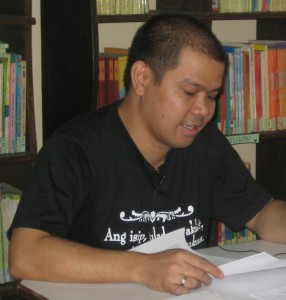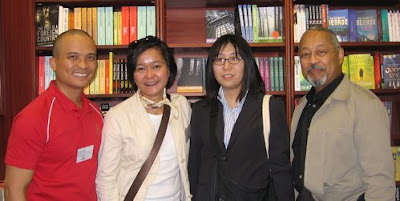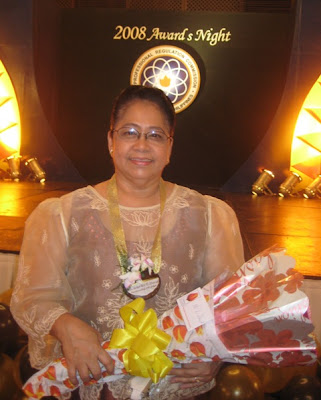Congratulations to the new librarians!
The passing rate for the Librarians' Licensure Examination went down drastically from 32 percent last year to 24 percent (237 out of 1003). Is the exam getting harder or are there just more unsuccessful repeaters this year? Wait for my update to "Librarians' Licensure Exams: 1992-2007," which should be out within this week.
Below is the Top 10 list from the Professional Regulation Commission (PRC), and the list of successful examinees as published in the Philippine Star. Surprisingly, the PRC website has already been updated—but the 2006 and 2007 results have still not been added. If you're one of the new librarians looking for a job, you may want to check out Job Openings and Career Development.
Top 10ELIJAH JOHN FERNANDO DAR JUAN, 87.75
BERNADETTE DAVA SUENO, 86.5
RUEL ROMARATE YU, 86.45
KRISTINE YAP MARTINEZ, 85.7
NOMER ALBARANDO ALCAZAR, 85.6
MARION JUDE MARISTELA GOROSPE, 84.55
JACQUELYN JOY LATINA LLAVE, 84.3
LORRAINE DAWN GAMEL HONRADE, 84.15
CZARINA PAOLA PAREJA DELA LLARTE, 84
EDWARD HILADO PUZON, 83.8
Successful ExamineesABASOLO, LAARNIE SADILE
ABDALA, MARIA PRETTY LAY TUPAY
ABELARDO, ANGELINE DELA CRUZ
ABUNAN, INOCENCIO JEVY CALIP
ABUTON, GRACIA CAGUIAT
ACOMULAR, FILIPINAS ASUNCION ADVENTO
ADRIANO, MARI ANGELI FALCON
AGBANLOG, JESUSA SALITA
AGRAAN, LUZMINDA AMBROCE
AGUILAR, ANALYN FRANCISCO
ALAYON, STEPHEN BIACO
ALCAZAR, NOMER ALBARANDO
ALCID, JOSEPHINE GARCIA
ALEJANDRIA, MARIA VANISSA PAQUIAO
ALFILER, ANA GRACE PARROCO
ALONZO, EVANGELINE AMARADO
AMISTAD, GEORGINA NAOE
ANDAL, ROWENA ENAJE
ANTONIO, JENNETH BATCAGAN
AQUINO, DANIEL FAUSTO SORNITO
ARIQUE, FEVIE MAYOL
AUSTRIA, EARL LUDWIGVAN REBELLON
AVILA, BELLA YARES
BAGUILNG, JONNALYN PULAC
BAGWIS, JONATHAN NISPEROS
BAJADO, JANE GLOBIO
BALLOVAR, NIKKO CASTILLO
BALOLAO, JULIE SUERTE
BANAWA, SUZETTE CABUNGAN
BANAYAT, JENNIFER PAEZ
BARCELONA, EMILY ALCAZAR
BARNACHEA, AMANTE CABILANGAN
BARO, GERALDINE TUMULAK
BARRIENTOS, ARSENIA JOSOL
BASTIAN, RONDA PELCHONA
BASTIDA, GARRY LEOPOLDO
BELEN, JENNIFER DELOS SANTOS
BENALIO, MARLON TANDAS
BENLOT, EMALYN TEPACIA
BERSALES, NOUVA DAINA SORIÑO
BIANG, ABELYN SAINGAN
BIANG, LIENDEN BONUAN
BIDASWA, MARIAN TOLEDO
BOLANTE, JENELYN BORDA
BORRAS, MARITES RUFFY
BUTCON, AIZA JOAN SANCHEZ
CABALLES, ANABEL HADAP
CABANTOG, JOANNE TORIDA
CALI, JOHAINA BASAR
CARREON, LEA NUÑEZ
CASANDRA, JANERIA JOY CORCOLLA
CASTRO, JANICE CABUHAT
CATALINO, DEBORAH BALLAGAN
CATAYLO, NEVILLE CABARABAN
CAYABYAB, JANICE ALPAJORA
CENIZA, HONELYNN CANONO
CENIZA, RAYMOND LAGUARDIA
CENTENO, RICHIE LUZ SUSIE
COMINTAN, SHERYL ATENTAR
CORTEZ, CHESTER CRISTOBAL
CRESCINI, PAULINA SANTIAGUEL
CUIZON, JUANITA BULAONG
DACWAYAN, GERALDINE PACIO
DAIZ, PHILIP MARK DE PANO
DAR JUAN, ELIJAH JOHN FERNANDO
DE GUZMAN, ANALEA
DE GUZMAN, GLENDA MANALO
DE GUZMAN, HERMINIA MENDOZA
DE LEON, MARIA TERESA DE VERA
DE VENECIA, LAARNI ANGCAP
DEGALA, MEG HOLASCA
DEL CASTILLO, ELIZABETH TABUENA
DEL ROSARIO, GRAZIELLA MAHICON
DELA CRUZ, MARY ANN FRANCISCO
DELA LLARTE, CZARINA PAOLA PAREJA
DELA PEÑA, RIZZA MARQUEZ
DELA ROSA, JENNA JOY BUGARIN
DELA ROSA, RODORA ABANILLA
DELOS SANTOS O P, SR MYRA DEBARBO
DILIDILI, ANALIZA PELLOS
DOGILLO, JULIE DOMALAON
DUCAS, ANDREW GABINO
DUERME, REZIA LOZADA
DUROLFO, JEANA ROSE TALATALA
EBALLE, REBECCA ESTRADA
ELIVER, ROQUE JR ABUAN
ENRIQUEZ, LOREBELLE QUILIZA
ESCOTE, NORIETTE CUBITA
EVALLE, JOSSA ESMORES
EVANGELISTA, DIA MARIE PAÑA
FAJARDO, MARITES AUYONG
FAJARDO, MICHELLE OLIQUINO
FAURA, BARBARA PEPITO
FERMIN, CHRISTIAN LINDBERGH MACASLAM
FERNANDO, MA SHEILA CEDRO
FERRANDO, GRESIEL ESQUADRA
FLORENDO, ROEL BALONZO
FLORES, MERLIE PAZ
FLORES, RHODORA ERMAC
FLORORITA, BABYLYN GARCIA
FONTANOS, CLEOFE MADRIAGA
FORTEZA, CRISTINE CORREA
FRANCO, MERLIZA TENORIO
FUERTES, YVETTE TORANEO
GACETA, CATHERINE URSULA LARON
GADOR, ROXENNE VILLAR
GARIBAY, ALLYN CASTILLO
GECONCILLO, GENEVIEVE CALUNSAG
GELLOANI, ROMA CAWAD
GENERAO, CHRISTIAN ARNE BAUTISTA
GODELOSON, CYRYL MENDOZA
GOMEZ, PIO SANDINO CALALANG
GOROSPE, MARION JUDE MARISTELA
GRAGASIN, ELJEAN DESAMITO
GRIGANA, MAYLENE FLORES
GUIMBA, ALESSANDRA AGAN
H SOLAIMAN, SOHAILAH DARAP
HIRANG, ANA DOMINGUEZ
HISTORILLO, JESALYN MAYO
HONRADE, LORRAINE DAWN GAMEL
HUFALAR, OLIVER BERGONIA
IMPLICA, MAGGIE MAY SALVADOR
INSAS, JESSICA CAMPANA
JIMENEZ, MA RUCHIELLA TOBIAS
LABAJO, ZHERYLL MAE RAZONABLE
LABAN, ALVIN DIVINA
LACASANDILE, JUBY LACASANDILE
LAGAR, CLIFFORD SECO
LAGDA, RHYMERRYZXIAMIKKO FLORES
LALIC, ROSITA SANTIAGO
LANGCAY, DIGNA TURINGAN
LAROZA, GERRY ONA
LASCANO, ELIZABETH ALLAN
LEYCO, LUCIA GUMPAL
LIM, JOANE OREL
LIZADA, ROSARIO ALBERTO
LLAVE, JACQUELYN JOY LATINA
LLAVE, MICHAEL CERVANTES
LUNAR, ALEXANDER TIAGA
MABANTO, IVY BASALAN
MABULOC, JOANNE JOCSON
MACABEO, NIKKI TOM-OKEN
MACAINAN, ROSALY GRAMATICA
MADALANG, NOVIE GRAILE BALIANG
MAGSAYO, RHODORA MAE TUMLAD
MALANA, JENNY DOLADO
MALLO, GERALDINE GARAY
MANABAT, APRIL RAMOS
MANGUBAT, FELICIDAD QUIMPO
MARANAN, CHARLIE BARBADO
MARIANO, JIMSON NAPOLEON DELA PEÑA
MARTINEZ, KRISTINE YAP
MATEO, ROSA MARIKIT MONTERO
MEMORIA, GRETA TRIBULETE
MENDOZA, ADEO CYRUS RAMOS
MERCADO, NORADY DINGLAS
MOLINA, AIMEE MICUBO
MONTECILLO, NILDA PILAR SANTOS
MORALES, TERESITA CONDE
MORES, NESTOR JR DAIZ
MOTILLA, ALICIA ERFE
MUNAR, BENEDICTA BAYAS
MUPAS, CHRISTINE FEBIE MIFA
MUÑEZ, JANIZE APRIL SO
NATIVIDAD, ARLENE DIAMANSIL
NICOL, RUBY ANN VIBAR
ODOÑO, MA MELISSA NAVAL
ONG-ONGAWAN, ELSA MARTIN
OSORIO, WENDYRICA OCAMPO
PADLAN, JODY JAMES SIMPAO
PADOGINOG, LIEZLE ELVERIO
PALATTAO, TEODINA TARCENA
PALAY, GRACE MONDRAGON
PALO, MARICRIS GALVEZ
PAMITTAN, VENANCIO JR SALADINO
PANGILINAN, JUDITH MAG-ISA
PAZ, MARIA CRISTINA TAGUIBAO
POSTRE, MARIFE GUIRIVA
PRADO, LOWELLA GONATO
PUZON, EDWARD HILADO
QUEVADA, JENNIFER ULTADO
RAIRATA, ISABEL NOREEN RODRIGUEZ
RAMO, MARIA BUNTAG
RAMOS, ALBI RABE
RAMOS, FARINMAE FERNAN
RAPA, MARIA VICTORIA BONCALES
REBADULLA, SIRK AUGUST COLANGAN
REGALADO, MARITES GRAZA
REVECHO, MARENEIL MERINO
REYES, LEONILA CUEVAS
RUBIATO, JOANNALYN DE LEON
RUIZ, TERESITA CASTILLO
SAINZ, MARY JEAN SIAMEN
SALAS, CATHERINE CALLEDO
SALAS, JESSA FRANCE CAMINADE
SAMONTE, JENIE RAFOLS
SANDOY, MARIA FE ABAIRO
SANGIL, KATHERINE CRUZ
SANTIAGO, BERNARDO LABAO
SANTIAGO, GINALYN MATIAS
SANTOS, JOHN REGINALD LAURENTE
SARABELLO, MISELISA BASILISCO
SEBIL, RIALENE RED
SERRANO, FARRAH LYN PALCE
SIACOR, MONA LISA PARDILLA
SIBOA, MARY CLAIRE LIBATON
SILAGPO, MA VERONICA ANTOINETTE HERRERA
SILVERIO, REAGAN BIEN
SIOCO, AIMEE JOLORO
SOBREVIÑAS, MARY GRACE CARCELLAR
SOMOSA, CECILIA RADA
SORIANO, MICHELLE TRIFONIA VALENTE
SOTELO, WERRIBEE VICTORIA CRISOSTOMO
SUANQUE, ROVIE ELISAN
SUENO, BERNADETTE DAVA
SUMAMPONG, NARMIE COMANDANTE
SURMIEDA, JANNY SOMBLINGO
SUÑEGA, ROWENA VIRTUDEZ
TABAMO, MINA TUBAN
TAGACAY, SANTIAGO III ANTOLIN
TAGTAG, JEFFERSON MATSU
TAMAYAO, MANUEL SIAPNO
TOMAS, ROSELYN DE CASTRO
TUBIG, JOAFRICA GOZUN
TUMBALI, CORAZON PASICOLAN
TUYOR, LEAH MAR
VALDEZ, JENY CATONG
VALENCIA, JOHN PROS BALANTAC
VELLEJO, RICHARD TIANSON
VERULA, AILYN DIZON
VERUTIAO, JERICA JOCSON
VILLANUEVA, HENRY NEMESIO ASPRA
VILORIA, ELENA MOJECA
VITOS, KRISTA KAMILLE GACRAMA
YNCLINO, MA FE LEAL
YU, RUEL ROMARATE
ZAFE, MARK VENICE MAGARRO
Read More...
Summary only...






















